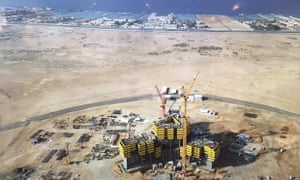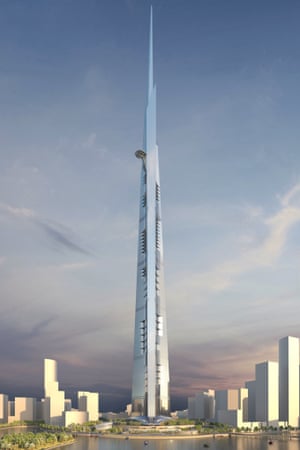 |
| Construction site of the Jedda Tower |
Up until now,
the Burj Khalifa, standing at 2,716 feet tall, was the tallest building in the
world, but this structure in Dubai might have met its match: Saudi Arabia’s
Jedda Tower, also known as Kingdom Tower, with a projected height of 3,280
feet. Saudi Arabia is working to get enough funding (1.23 billion) for this massive
in-progress project. Currently, the tower stands at 26 floors tall, with the plan for
174 more floors to be built.
 |
| Computer created image of the Jedda Tower after completion |
Architecturally,
this building will be incredibly impressive. This structure, made of steel and
concrete, is on the coast, where potentially damaging saltwater might cause a
problem in the foundation. Another major challenge is the wind, as this
building will be so tall. The creative solution? The tower “changes shape every
few floors, [so] the wind loads go around the building and won’t be as extreme
as on a really solid block” (CNN). Although there are many challenges, Sang Dae
Kim, director of the Council on Tall Buildings, believes that this building can
be built.
Questions:
Do you think UAE (the country
where the Burj Khalifa is) will be upset?
Should tallest building be a
measure of success of a country?
Would you want to go to the
tallest floor of this building?
Sources:
5 comments:
There will always be people trying to break records. I don't have an issue with it, but having the tallest building doesn't seem to measure success to me. I would rather the money, labor, and time spent by the all-important "Council of Tall Buildings" (something the world clearly needs) go to helping those in need instead of creating more office or hotel space. Size doesn't matter.
The UAE won't be upset, I doubt having the tallest structure in the world is more important than the other pressing issues facing the small Middle Eastern country. Some background on the UAE: it's tiny, bordering Oman to the east and Saudi Arabia to the south, with a population of around 9 million (of which only 1.4 million are actual citizens, the rest are expatriates, people coming to the country for economic reasons). They might try and eventually build a tower even larger, but that's simply the phenomenon that Cecily mentioned about countries/people always trying to break records for the global spotlight. The UAE has a pretty poor track record of human rights, being under the Sharia law, and they have pretty substantial oil reserves for such a small nation. They'd probably be able to complete such a project; however, I think that in recent years the race to building the tallest skyscraper and other similar projects has sort of lost its novelty to the world's general public: in most of our eyes now, a tall skyscraper is simply a tall skyscraper and it's undoubtedly a unique modern invention but we've become so used to seeing them that they don't seem as special anymore.
Tallest buildings definitely aren't a substantial measure of the success of a country; I agree with Cecily. It may indicate the economic status of the country on some level, but it certainly doesn't say anything about the social status quo or pretty much anything else regarding the nation. You can't ignore these factors, as they all contribute to the overall "success" of a country as you mentioned. In fact, I think it's difficult to really measure the general "success" of any country; the US has definitely struck a sort of balance in general economic prosperity while maintaining rights, but there are many countries that are economically successful (China comes to mind), but definitely don't provide the same standards of living conditions and employment opportunities as their economic output might suggest.
If I had the opportunity to, I guess I'd want to go to the top of the building. I'm guessing that most of it would be office space/living quarters, so I don't think the interior will be particularly exciting, but going to the top and seeing the view would probably be a pretty unique experience.
Surely ethical and environmental impression are to be considered when planning such feats, but in regards to Emma's second question asking whether buildings can be a measure of a country's success, I believe that to some extent, the competition among countries to construct the tallest and most glamorous buildings have sidelined an appreciation for art. Granted, it's not to say that these spectacular skyscrapers are not beautiful, but recently, I've come to realize that perhaps people are more orientated towards the technological and commercial implications of the buildings rather than its architectural incorporations.
This has certainly been seen in the past with ancient civilizations looking to construct large buildings as a representation of their power and prestige. In doing so, the civilization will often overlook other principles, oftentimes employing a slave force to carry out the arduous work. I understand that slaves obviously won't be used to complete this building, but the example was simply to show how fixated countries are to become the most popular and global spectacle. In essence, many civilizations, in the past, and countries, today, have prioritized their allure to achieve an elite status to outshine other components that may or may not be deserving of more attention.
I think it is possible that the country that currently contains the tallest building could be upset as it is a widely distinguishing characteristic of their country and it makes them more well known. They will lose that if they lost that status of having the tallest building in the world. I don't think that having the tallest building should be a measurement of success however. It is more important that they country uses the notability of having the tallest building to improve their country, for example, their economy or government. Personally, I would not want to go up to the top floor of the tallest building. Sure, it sounds very impressive; however, you never know what could happen. A huge storm could suddenly occur and destroy the building. It is very, very high up.
The UAE would of course rather retain the record of having the tallest building in the world, but I don't predict this being much of an issue. In the grand scheme of things, a building is unlikely to create much tension between the two countries. The Burj Khalifa has definitely made a large impact on tourism in the country, specifically Dubai. Many people want to visit the world's largest building, if for nothing else but simply to say they've done so. Its presence has increased hotel business by a considerable amount (~35%), indicating that economically the tower has had an impact. If the Burj Khalifa loses its status as the tallest building, then less people will travel to Dubai; however, this does mean people will not be still be attracted to it for its architectural brilliance and whatnot. The tower will remain an interesting place to visit, albeit perhaps not to the same degree as before, so there will not be such a significant loss suffered by the UAE as to elicit some severe response.
Building the tallest building in the world is not a measure of a nation's success, or at least it isn't a very significant indicator. There are so many other factors to consider (living conditions of the population, performance of businesses, etc.), so one building could not carry so much weight that it can be considered an accurate representation of a nation's success.
While I do have a slight fear of heights, the view and sense of personal accomplishment associated with going to high up places usually is enough to assuage my fears. I would be hesitant to visit the top floor right after the building is constructed, but after enough time has passed and the tower has proved its structural stability, I would be willing to ride the elevator up to the top floor. I can imagine the view being a very worthwhile sight.
Sources:
http://www.thenational.ae/business/travel-tourism/burj-khalifa-a-towering-tourism-influence
Post a Comment